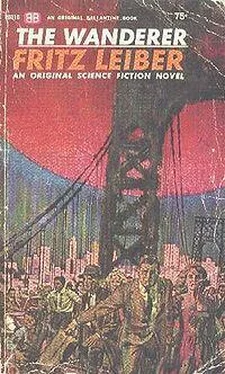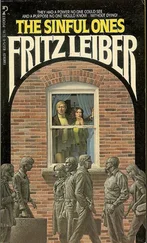She grinned at him, her whiskers laying back across her violet cheeks, the black pupils of her eyes shrinking to pinpoints, and she pointed a violet-gray foreclaw at his heart and said: “Bang!”
After a moment he chuckled miserably and admitted, “All right, Tigerishka, I guess I have to be some sort of lower animal to you, but in that case look into my mind and tell me what’s wrong with me. Why am I so mixed up?”
The pupils of her eyes expanded to stars — black spidery stars in a violet sky.
“Why, Paul,” she said gravely, “ever since you forced me to treat you as an intelligent being — primitive but intelligent, bearing a little living universe inside — it has no longer been a simple thing for me to go deep into your mind. It’s more than a matter of having to ask your permission now. But I have gathered some notions about you, and if you want I will tell them to you.”
He nodded. “Go on.”
“Paul,” she said, “you resent being treated like a pet, yet that is how you treat the people around you. You stand back and watch their antics with tolerant understanding and you nurse and guard and cajole the ones you love: Margo, Don, your mother, several others. You call this friendship, but it’s nursemaiding and devouring. A decent cat wouldn’t do it to her own kittens.
“You stand back and watch yourself more than is healthy. You live too much in the self watching you and in the third self watching the second, and so on. Look!” She switched the windows to mirror. Her foreclaw placed itself between his right eye and his own stacked reflections and somehow ticked off the edges of the first six of them exactly.
“See?” she said. “Each watching the one in front I know — all intelligent animals are self-observing. But you live too much in the reflections, Paul. Best to live mostly in front of the mirror and just a little in the watchers. That way courage comes. Don’t live in Watcher Number Six!
“Also, you think other people same as your watchers. You cringe from them, then criticize. But they not. They got watchers too, watching just them.
“Also, love yourself more, or you can’t like anybody.
“ ’Nother thing ’bout you,” she finished, dropping wholly back into monkey-talk, “fight-reflexes pretty poor. Likewise dance. Likewise sex. Not ’nough practice. That’s all.”
“I know you’re right,” Paul said haltingly in a small, tight voice. “I try to change, but—”
“ ’Nough thinking ’bout self! Look! See one our big saucers save one your towns.”
Ceiling and floor were transparent again. They were descending at a rapid slant toward a dark branchwork merged with a pale checkerboard mesh, from the center of which brown rings were expanding outward toward a circular brown rim that merged into bluish gray. High above the center of the circles hung a golden and violet saucer which he judged had to be huge from the cloud-arm between them.
The mesh grew larger — it was streets. And the squares were blocks of buildings.
The brown rings were humpings of silt-laden water being driven out of the city.
He recognized, from remembered pictures, the great buildings of Elektrosila and the Institute of Energetics, the blue-green of the Kirov Theater, the Square of the Decembrists. The branchwork must be the streams of the Neva delta, and the city itself, Leningrad.
“See? We save your beloved cities,” Tigerishka said complacently. “Momentum engine of big saucer move only water. Very smart machine.”
Suddenly the saucer dipped so close he saw the cobblestones, a mud-buried gutter, and the sprawled, silt-drifted, water-grayed bodies of a woman and a little girl. Then a low brown wave surged over them, a gray arm and a gray, bearded face lifelessly flinging out of the dirty foam.
“Save?” Paul demanded incredulously. “Yes, after killing your millions — and if the rescue isn’t worse than the disaster! Tigerishka, how could you bring yourself to wreck our world just to get fuel a little faster? What frightened you into it?”
She hissed: “Stay off that subject, Paul!”
Richard Hillary limped along swiftly — a dimentionless point in the atlas-page England Paul had been viewing, but a living, breathing, frightened man for all that. He was sweating profusely; the sun beat in his face. He was panting and at every other step he winced.
The pedestrian equivalent of a fast car on a big highway, Richard had outdistanced the pack behind but yet had not caught up with the pack ahead, if there was one. The last signpost he had seen had pointed, quite appropriately, he was certain, to “Lower Slaughter.”
Squinting ahead, he could see that after some hundred yards the road began leisurely to wind up a high, forest-capped hill.
But, looking behind, his sun-dazzled eyes could see only a crazy scattering of sheets and serpents of water.
The fattest serpent was the road he was traveling, and now it suddenly began to fill where he was, brimming over from the ditch to the left. Hardly an inch, yet it unnerved him.
To the right was a forbiddingly fenced field of young barley, a bit higher than the road and mounting directly toward the hilltop. He climbed the fence, unmindful of the tearing of the barbed wire, and set on again through the swishing green. With a startling sudden beat of wings, a crow emerged just ahead and took off, cawing with hoarse disapproval. Although Richard’s legs were cramping now, he increased his pace.
He heard a rumble of low, distant thunder. Only this was the sort of thunder that doesn’t die away muttering, but gets louder, louder, louder. Richard didn’t think he could do it, but he began to run, run at his top speed uphill. There was a rush of rabbits from behind him. At one point he could see a dozen white bounding forms.
From the sides of his eyes he began to glimpse brown-frothy, whirling, pursuing walls. The thunder became that of a dozen express trains. At one moment there was yellow foam around his feet, at another it looked as though a swinging, dust-raising surge would cut him off.
Yet he did make it to the hilltop, and the waters didn’t get quite that far, and the thundering began slowly to fade.
As he swayed there panting, his lower chest feeling as if it had been kicked, there stepped out of the trees just ahead a straight-backed, small, elderly man with a shotgun.
“Stand, sir!” this apparition cried, directing the weapon at Richard. “Or I’ll fire.”
The apparition was dressed in brown gaiters, gray knickerbockers, and a lilac pullover. His narrow, wrinkled, watery-eyed face was set in lines of grimmest disapproval.
Richard stood, if only because he was so utterly and painfully winded. The thundering died away completely as the turbid water leveled a little way down the hill.
“Speak up!” the apparition cried. “What lets you think you have the right to trample my barley? And how did you let in all that water?”
Finally getting some of his breath, Richard shaped his lips in a grave smile and said: “It wasn’t deliberate on my part, believe me.”
Sally Harris, the midmorning sun glowing from the solid gold threads in her bikini, peered down over the balustrade and called back a running commentary.
Jake Lesher sat by a cup of black coffee flaming almost invisibly with Irish whiskey and puffed a long greenish cigar. Occasionally he frowned. A notebook stood open at two blank pages beside the coffee cup.
Sally called, “The water’s ten stories higher than last time. The roofs are packed with people and there’s two or three at every window I can see. Some are standing on the ledges. We’re lucky our skyscraper had a fire and the elevator’s stuck. Somebody’s shaking his fist — why me, what have I done to you? Somebody else just took a high dive — ouch, bellywhopper! The current’s fierce — it’s pushing a police launch backwards. You there, quit pointin’ your cane at me! There’s mothers and kids and—”
Читать дальше










